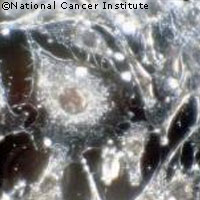Scientists shed new light on workings of anti-cancer protein
European researchers have shed new light on how the p53 protein controls other proteins to protect us from cancer. The work, which brings together scientists from Sweden, Germany and Switzerland, is published online in the Proceedings of the National Academy of Sciences. The protein p53 is found in every cell in our body and it plays a key role in preventing the development of malignant tumours. When our cells are subjected to stresses such as DNA damage or a lack of oxygen, p53 can intervene in a number of processes, such as DNA repair. It can also trigger the programme for cell death, and so prevent the cancer from spreading to the rest of the body. Around half of all tumours in humans have a defective p53 gene, and mice lacking the gene develop tumours at an early age. For these reasons, cancer researchers are keen to uncover the details of how p53 works, in the hope of developing new therapies to fight cancer. So far, most studies on p53 have focused on how it interacts directly with our genes. In this latest piece of research however, the scientists studied the proteins themselves which are controlled by p53, by comparing the protein make up of cells with normally functioning p53 with those of cells without p53. 'p53 can be likened to a conductor leading a cellular orchestra,' explained Professor Klas Wiman of the Karolinska Institute, one of the authors of the paper. 'Whereas we previously knew which instruments, or genes, make up the orchestra, we now have an idea of the music it plays, by which I mean the proteins that the genes express.' The researchers identified a total of 115 proteins which were affected by p53, a result which the researchers say is consistent with previous studies suggesting p53 may regulate 2 to 4% of all human genes. Some of the proteins were already known to be linked to p53 but others were not. The proteins identified are involved in a wide range of cell processes, including cell death, cell growth control and ageing. 'Our findings support the notion that the p53 tumour suppressor regulates cell growth and survival and other cellular processes at multiple levels through diverse and interconnecting pathways,' the researchers write. 'Further analysis of p53-regulated proteins should provide a better understanding of the molecular mechanisms behind p53-mediated tumour suppression.' 'Many of the mechanisms were previously unknown, and in several cases we can see changes at a protein level only, and not at gene level,' commented Professor Wiman. 'We believe this information to be of value to the development of new therapies.'
Countries
Switzerland, Germany, Sweden



